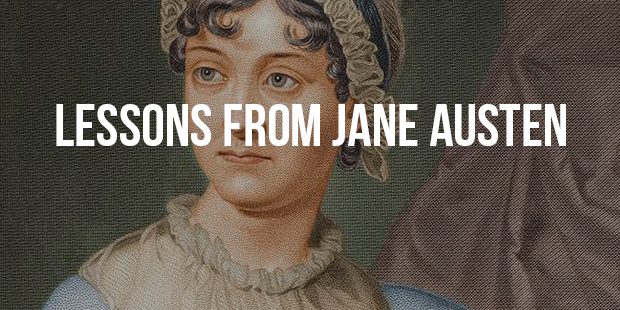Life Lessons From Jane Austen Novels

It is a truth universally acknowledged that the novels of Jane Austen remain some of the most popular in the world, outselling well-known authors of today like John Grisham and spawning countless adaptations, sequels, prequels, and retellings. The explanation for Austen’s longevity as a literary phenomenon is simple; her novels resonate with truth about the human character and the joys and sorrows of life, at once encouraging us to laugh at ourselves and challenging us to scrutinize our failings alongside our admirable qualities.
Here are 10 life lessons we can all learn from Jane Austen’s novels
1. Don’t let your imagination run away with you

Northanger Abbey (1817) is probably one of the first examples of fanfiction in Literature. When young Catherine Morland, captivated by the Gothic novels of Ann Radcliffe, receives an invitation to stay with her friends the Tilneys at Northanger Abbey, she becomes carried away on a wave of fantasy and intrigue, convincing herself that General Tilney secretly murdered his wife. While she still manages to snag the general’s son Henry for a husband in the end, accidentally accusing your future father-in-law of murder isn’t the quickest way into his good books. Here Austen satirically reminds us of the dangers of allowing our minds to play tricks on us and letting fancy override logic.
2. Don’t get too cocky

Are you listening, all the Mr. Darcys out there? If Darcy learns one lesson in Pride and Prejudice (1813) from his first ill-fated proposal to Elizabeth Bennet, it’s that thinking too highly of oneself won’t endear you to anyone. Never approach anything in life as if it’s a settled thing; work to earn the respect of your friends, your family, your coworkers, and, most importantly, your spouses.
3. Never presume to know what’s in a person’s heart better than they do themselves

Emma Woodhouse, the titular character of Emma (1815), thinks she’s doing Harriet Smith a favor when she tries to separate her from the gentleman-farmer Robert Martin and match her with a more worthy husband, but little does she know how deeply Harriet and Robert truly care for each other. While everything turns out well in the end (as it always does in Austen’s universe) the resolution doesn’t come without much heartache and embarrassment for all parties involved.
Support the decisions of others; voice your concerns when appropriate, but never presume to tell anyone what they should think or how they should feel, particularly in matters of the heart.
4. Speak your mind

Obstacles Live in Your Own Mind
Fanny Price, the heroine of Mansfield Park (1814), often gets shunted to the side in discussions of Austen heroines; she doesn’t have Lizzie Bennet’s wit, Anne Eliot’s quiet self-command, or even Emma Woodhouse’s playful charm. She cowers in the presence of her uncle, Sir Thomas Bertram, is practically her Aunt, Mrs. Norris’s personal servant, and doesn’t even object when Mrs. Norris insists that Fanny doesn’t need a fire in her room, because she needs to remember her place. Yet Fanny has enough self-confidence to stand her ground—even if she’s shaking in her shoes while doing it—when it really counts.
Think about the moment when she stands up to her uncle and refuses to accept Henry Crawford’s marriage proposal. Lucky for her that she does, since Henry later runs off with Mariah Bertram…after her marriage! Close call, Fanny. Timid though she is, Fanny Price reminds us to stand firm in our convictions and protect our own interests.
5. Learn when to hold your tongue

Yes, we’re looking straight at you, Mr. Collins; nobody likes a windbag. His excessively eloquent speeches in Pride and Prejudice Do little more than fill already stuffy ballrooms with even more hot air. Likewise, Miss Bates, Jane Fairfax’s chatty, maiden aunt in Emma, prattles aimlessly away to the amusement (and often the irritation) of her neighbors. The danger of mindless chatter is, of course, saying too much, as we learn when Mrs.
Bennet speaks so loudly and presumptuously about Jane’s eventual marriage to Bingley that she unwittingly harms all of her daughters’ chances of marrying with her uncouth manners. There is a time to speak and a time to be silent, and learning to recognize the difference between the two is a social survival skill worth cultivating.
6. Keep your head in a crisis

Anne Eliot knows all about this one; anyone who has read Persuasion(1818) will recall Louisa Musgrove’s ill-fated leap from the cob so that Captain Wentworth can catch her in his arms, only to wind up with a nasty head injury. While everyone else is flailing in panic, fearing that Louisa is dead, only Anne has the sense to keep calm and give directions about carrying her to the nearest inn and sending for a doctor.
While being the only one in the group to keep your wits about you means that everyone relies on your strong nerves by default, you can at least have the satisfaction of knowing that when cooler heads prevail, you can solve problems more easily.
7. Live your life according to your own dictates

Lizzie Bennet says it best when she refuses to promise Lady Catherine never to enter into an engagement with Mr. Darcy not only because she shrewdly suspects him to still be in love with her, but because she refuses to let anyone decide her own destiny: “I have only resolved,” she declares, “to act in that manner which will, in my own opinion, constitute my happiness, without reference to you, or to any person so wholly unconnected with me.” Austen’s lesson here is fairly self-explanatory: never allow anyone to dictate the choices you make with regard to your own happiness.
8. Don’t let your emotions get the better of you

This is basically Sense and Sensibility(1811) summarized in one concise sentence. When Marianne Dashwood discovers that Willoughby, the young man who has been paying her attention, has in fact been engaged during the entirety of their association, anyone with an ounce of human sensitivity can’t blame her for feeling crushed, but walking about in the rain and intentionally catching such a severe chill that it nearly kills her seems a bit extreme. No man is worth that much. There’s nothing inherently wrong with wearing your heart on your sleeve, but over-dramatization and self-martyrdom never does anyone any good.
9. Sometimes you’re going to be the brunt of a joke

How to Face With Change in Your Life
Toward the end of Pride and Prejudice, Mr. Bennet wisely observes, “For what do we live, but to make sport for our neighbors, and laugh at them in our turn?” This adequately sums up the comedy of life; when we’re not having a laugh at someone else’s expense, someone is likely having a laugh at ours. It might be spiteful, but it’s human nature. If it’s your turn to be laughed at today, it will be someone else’s turn tomorrow, so it’s best not to get too bent out of shape over it.
10. Choose your words carefully

Even if there’s a kernel of truth in Mr. Bennet’s observation about our propensity to laugh at others, Austen still reminds us that a joke can sometimes be carried too far. Many of us probably remember, with a twinge of sympathy for all parties, Emma’s slight of Miss Bates at Box Hill, when she declares that Miss Bates would have difficulty in a game in which she’s required to say three very dull things because she would be limited as to number. (Ouch!) If that’s not the Austenian version of calling someone an airhead, I don’t know what is. Yet Miss Bates isn’t so silly that she misses Emma’s meaning, and it hurts her dreadfully.
She might be exhaustively chatty, but she’s gentle and kind-hearted, and in her impoverished condition as a spinster, she highly values the company and generosity of her neighbors. Choose your words carefully; what might seem like a harmless gest to you might cause someone else a great deal of discomfort.









